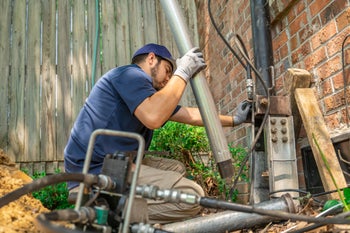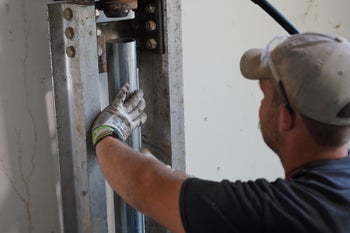Why You Should Fix Cracking in Brick Walls
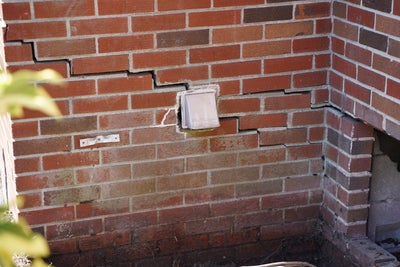
Brick walls are strong, but they’re not unbreakable. After a while, or under certain situations, you might start to see cracks in brick walls, and that’s not good for your house.
What you need to remember is this: when brick walls start to crack, it likely means there’s a problem with your home’s foundation. We’re going to cover all you need to understand about this kind of damage.
Guide to Different Kinds of Brick Wall Cracks
Brick walls are a popular choice for houses and buildings. They look nice, last a long time, and are pretty resilient. However, even the best brick walls can start to show cracks over time, especially if foundation settlement occurs. Let’s talk about what these cracks might mean.
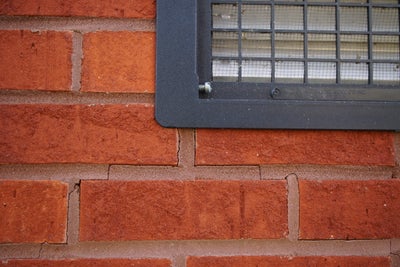
Hairline Cracks
- Looks Like: Really thin lines that are tough to spot unless you look closely.
- Why They Appear: They might show up because your house settles a little, the weather changes, or the bricks get old.
- When to Worry: If you start seeing these cracks get wider or there are a lot of them, you should probably ask an expert for advice.
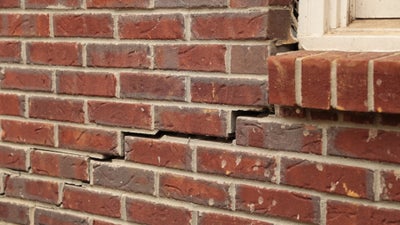
Stair-Step Cracks
- Looks Like: These cracks make a pattern that looks like stairs, moving up and down along the cement holding the bricks together.
- Why They Appear: It usually means the ground underneath your house isn’t staying still and might be shifting a bit.
- When to Worry: Since it could mean there’s a problem with your house’s foundation, it’s smart to have a foundation expert check it out.
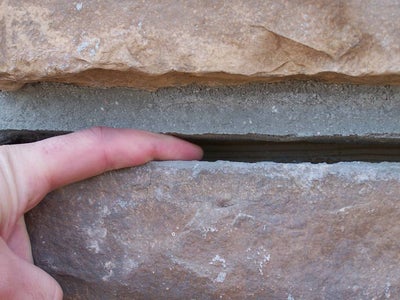
Horizontal Cracks
- Looks Like: Lines that go straight across the wall from one side to the other.
- Why They Appear: This kind of crack is often caused by the dirt outside pushing against the wall, which can happen if it gets really wet or really dry.
- When to Worry: Cracks like these can show that the wall is being pushed too much, which might cause serious problems for your house’s structure.
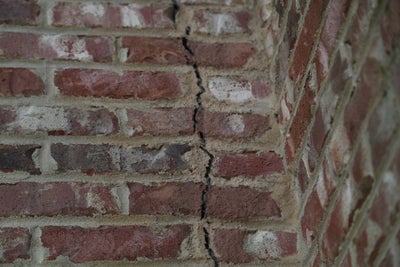
Vertical Cracks
- Looks Like: Long lines that go straight up and down the wall.
- Why They Appear: These are usually because your house is settling a little, which is pretty common, especially with new houses.
- When to Worry: If these cracks seem to be getting bigger, it’s wise to get them checked to make sure there’s no big problem.
Knowing about these cracks is the first step to keeping your house in good shape. If you see cracks getting worse, or if something just doesn’t feel right, it’s better to check it out sooner rather than later with help from a professional.
What Causes Cracking in Brick Walls?
In California, cracks in brick walls often trace back to problems with the foundation. If the foundation deals with any kind of damage, it can cause brick walls to shift and crack.
How Does a Foundation Become Damaged?
- Soil Composition: Certain soils, like those containing clay, expand when wet and shrink when dry. In California’s varied climate, this often leads to the foundation moving up and down, destabilizing brick walls and causing them to crack.
- Water Issues: Water is a major cause of foundation damage. Poor drainage causes water to pool around the foundation, softening the soil and leading to a sinking foundation. This movement causes cracking in brick walls, so it’s important to maintain gutters, downspouts, and proper yard slopes to keep water flowing away from your house.
- Weather Conditions: California’s weather, from heavy rains to droughts, affects the soil around your home. This can lead to too much moisture or not enough, both of which can harm your foundation. While California might not experience extreme cold often, in areas that do, frozen ground moisture can expand and push against the foundation.
- Tree Roots: Trees planted too close to your home can also harm the foundation. Their roots draw moisture from the soil, potentially leading to soil shrinkage and foundation settling. Additionally, roots can grow directly into the foundation, causing cracks and damage over time.
How Do Foundation Issues Lead to Cracks?
When a foundation shifts, it’s not just shifting by itself—the entire house, including the brick walls, shifts too. Here’s how that movement can cause different kinds of cracks:
- Soil Changes: The soil underneath a house can expand and contract, leading the foundation to move up and down or side to side. This kind of movement can pull bricks and mortar apart, creating cracks. When the soil changes size, you might notice zigzag cracks as different sections of the house shift in different ways.
- Water Pressure: If there’s a lot of water in the soil around your foundation, and the drainage isn’t doing its job, the soil can push against the foundation walls. This kind of pressure might cause straight, horizontal cracks as the foundation walls try to resist the push.
- Foundation Settling: It’s normal for houses to settle a little after they’re built. But if a house settles too much, maybe because of poor soil conditions or harsh weather, it can lead to vertical or zigzag cracks. These cracks are signs that the house is trying to adapt to its shifting foundation.
Knowing why these issues happen can help you catch problems early on. If you start seeing cracks, it’s a sign that something’s moving that shouldn’t be. Catching foundation issues early can save you a lot of trouble (and money) down the road.
Solutions to Fix Cracking in Brick Walls
When you’ve got cracks in your brick walls and problems with your foundation, it’s best to work with a professional team that has the tools and skills to fix the problem the first time. Bay Area Underpinning has been trusted by homeowners in California since 2005—we can identify and repair your home’s foundation issues. Let’s look at some ways our team can fix and prevent cracking in brick walls.
How to Fix a Foundation
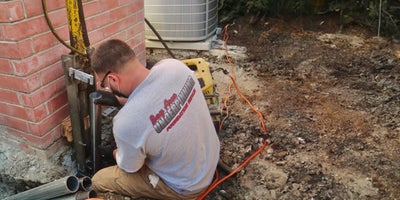
- Foundation Pier Systems: These metal rods attach to the foundation and are inserted into sturdy rock below the soil. This helps stop the foundation from moving and properly redistributes the weight of your home, preventing cracks from showing up.
- Crawl Space Support Jacks: Crawl space support jacks lift and stabilize sagging floor joists, ensuring the floors above remain level and stable. This method is essential for maintaining the structural integrity of homes with crawl space foundations by addressing unstable support structures.
- Pier and Beam Foundation Repair: Steel support jacks raise and stabilize sagging beams and floor joists, redistributing the home’s weight more evenly. Additionally, sonotubes filled with concrete are placed under the piers to strengthen the foundation and prevent further sinking or shifting.
Why Fixing Your Foundation is Important
Patching up cracks in a brick wall without fixing foundation issues won’t really solve anything. Cracking in brick walls is just a symptom of foundation damage, so without the proper repair, the damage can always come back. Bay Area Underpinning focuses on repairing your foundation to prevent cracks from coming back in the future.
Preventative Measures You Can Take
Repairing foundation damage is best left to professionals, but there are some ways you can help prevent foundation problems from happening. Here are some tips:
- Proper Drainage: Make sure water flows away from your house, not towards it. This can involve sloping the ground away from your foundation or installing gutters and downspouts to direct rainwater away.
- Regular Inspections: Having your foundation inspected regularly can catch problems early before they get big and expensive.
- Stay Vigilant: Keep an eye out for other foundation issues. If you see uneven floors or doors and windows that won’t open, call someone out to inspect.
By taking these steps, you can help keep your foundation strong and avoid problems down the road. And if you do run into issues, Bay Area Underpinning can inspect and repair your home’s foundation, keeping it supported for years to come.
FAQs
The cost is determined by several factors, including the level of damage and the repair solutions implemented. For a precise quote, get in touch with Bay Area Underpinning. We offer free inspections and estimates, straightforward pricing, and various financing options.
Mortar repair alone won’t halt the progression of cracks. Foundational issues must be addressed first, after which re-mortaring can be effective.
Keep an eye on brick veneers, basement walls, and chimneys, as these areas are prone to initial and often overlooked cracking.
Schedule a Free Foundation Inspection With Bay Area Underpinning

If you have concerns about the cracks in your brick walls, don’t hesitate to contact Bay Area Underpinning. We’ve been helping homeowners in California protect their foundations since 2005, and we’re ready to do the same for you.
With industry-leading solutions and an experienced team, we’re committed to taking care of your home. Don’t let cracks in brick walls ruin the safety of your home—schedule a free inspection with us today!
Related Resources
Publish Date:
Last Modified Date:
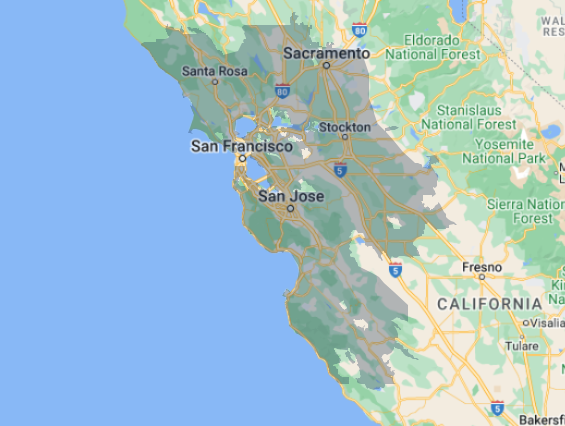
Our Locations
2333 Courage Dr. Suite C
Fairfield, CA 94533
1161 N Fair Oaks Ave
Sunnyvale, CA 94089

